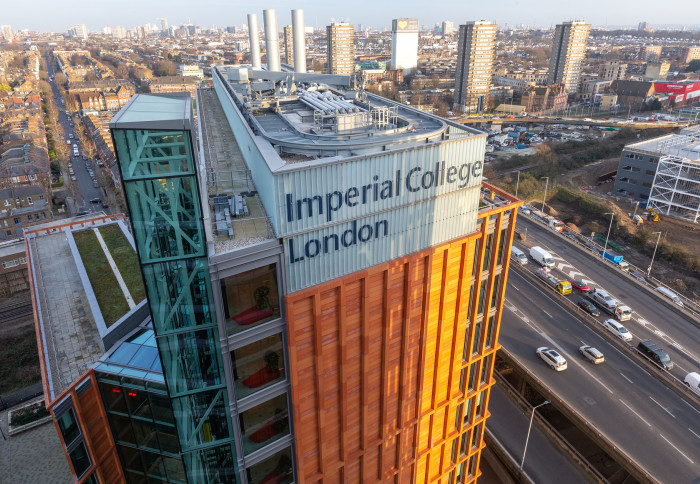I-X award and compost health risk: News from the College

Here’s a batch of fresh news and announcements from across Imperial.
From success for Imperial’s ‘university of the future’ initiative, to a warning over potential health risks from compost, here is some quick-read news from across the College.
I-X award
 Imperial’s I-X initiative is among the first-ever successful applicants to The Alan Turing Institute’s Network Development Awards.
Imperial’s I-X initiative is among the first-ever successful applicants to The Alan Turing Institute’s Network Development Awards.
Launching in 2022, I-X will harness the College’s excellence in AI, machine learning, and data sciences to address challenges in health, space, environment, economy, virtual reality, internet of things, and communications.
The Award, worth £18,513, establishes links with the Turing and will help I-X to foster equality and diversity in its work.
I-X Co-Director Professor Peter Pietzuch, of the Department of Computing, said: “This Award is an excellent vehicle to create an initial link between I-X and the Alan Turing Institute, which in turn will help shape the evolution of I-X over the next few years.”
I-X's research programme aims to deliver ambitious scientific ‘moonshots’ in the next 5-10 years. It brings together multi-disciplinary academic teams from across Imperial with companies and non-profit labs to identify and fix problems through the ‘University of the future’.
Recruitment is open for 13 new faculty members to join I-X.
Radiation in a vacuum
 Energetic charged particles leaving nuclear reactors can cause ‘Cerenkov radiation’ – a faint blue glow caused by the particles travelling faster than light. While light is slowed by water, nothing travels faster than light in a vacuum, so it was assumed Cerenkov radiation could not be produced in a vacuum.
Energetic charged particles leaving nuclear reactors can cause ‘Cerenkov radiation’ – a faint blue glow caused by the particles travelling faster than light. While light is slowed by water, nothing travels faster than light in a vacuum, so it was assumed Cerenkov radiation could not be produced in a vacuum.
Now, researchers from Imperial’s Department of Physics and Fudan University in China have proposed a way to bypass this light barrier and produce Cerenkov radiation in a vacuum.
They make use of a dielectric surface – one with very poor electric conductivity – that has a phased wavelike disturbance. When an electrically charged plate approaches the surface it induces charges, which appear to move because of the time dependence of the surface. However, because there is no physical motion no laws of physics are violated if the motion appears to be faster than the speed of light in vacuum, which is good enough to generate radiation.
Read the full paper in Physical Review Research: ‘Cerenkov radiation in vacuum from a superluminal grating’
Earthshot nominations
 The search for the winners of 2022’s Earthshot Prize has begun, with Imperial named as an official nominator for the global prize to discover new solutions to the world’s biggest environmental problems.
The search for the winners of 2022’s Earthshot Prize has begun, with Imperial named as an official nominator for the global prize to discover new solutions to the world’s biggest environmental problems.
The prize, which was launched in 2020 by the Duke of Cambridge and Sir David Attenborough, awards a grant of £1 million to individuals or organisations for work to address one of the five Earthshot categories: ‘Protect and Restore Nature’, ‘Clean our Air’, ‘Revive our Oceans’, ‘Build a Waste-Free World’, ‘Fix our Climate’.
As an official nominator, Imperial has been selected as one of more than 300 organisations to submit nominations across the five categories. Solutions should be tested in the field or with target audiences and be at a ‘tipping point’ for scaling their impact within the next five years.
If you have an inspiring solution that fits the criteria, please fill out this form before the deadline of 21 February.
Compost health risk

Compost presents a potential public health risk due to exposure to high concentrations of Aspergillus fumigatus spores, a citizen science project has found.
The study led by Jennifer Shelton, conducted at Imperial and the UK Centre for Ecology and Hydrology, used 509 soil samples collected from gardens by 249 citizen scientists. It found soil samples containing compost were significantly more likely to grow A. fumigatus strains that were resistant to medical triazoles used to treat a lung infection associated with the fungus.
Aspergillosis is a lung infection that results from inhalation of A. fumigatus spores and can cause serious illness. People with weaker immune systems or lung damage from previous infections are especially vulnerable to aspergillosis, but those without predisposing conditions can develop it if they inhale enough spores.
Ms Shelton said: “The research suggests that handling compost presents a public health risk when individuals are exposed to large numbers of aerosolised spores and raises questions of whether compost bags should carry additional health warnings, whether compost should be sterilised before shipping, and whether individuals should be advised to wear face masks when handling compost.”
Read more about the study in Applied and Environmental Microbiology.
Want to be kept up to date on news at Imperial? Sign up for our free quick-read daily e-newsletter, Imperial Today.
Article text (excluding photos or graphics) © Imperial College London.
Photos and graphics subject to third party copyright used with permission or © Imperial College London.
Reporter
Conrad Duncan
Communications Division
Caroline Brogan
Communications Division
Hayley Dunning
Communications Division